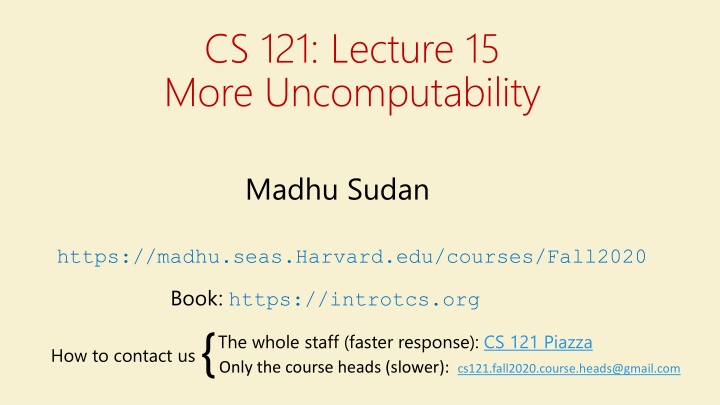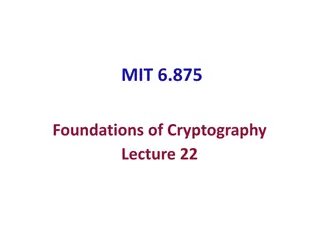
Uncomputable Functions and Diagonalization in Theory of Computation
Explore the concept of uncomputable functions and diagonalization in the theory of computation through examples and proofs, demonstrating the pervasive nature of uncomputability in programs.
Uploaded on | 3 Views
Download Presentation

Please find below an Image/Link to download the presentation.
The content on the website is provided AS IS for your information and personal use only. It may not be sold, licensed, or shared on other websites without obtaining consent from the author. If you encounter any issues during the download, it is possible that the publisher has removed the file from their server.
You are allowed to download the files provided on this website for personal or commercial use, subject to the condition that they are used lawfully. All files are the property of their respective owners.
The content on the website is provided AS IS for your information and personal use only. It may not be sold, licensed, or shared on other websites without obtaining consent from the author.
E N D
Presentation Transcript
CS 121: Lecture 15 More Uncomputability Madhu Sudan https://madhu.seas.Harvard.edu/courses/Fall2020 Book: https://introtcs.org { The whole staff (faster response): CS 121 Piazza How to contact us Only the course heads (slower): cs121.fall2020.course.heads@gmail.com
Announcements: Advanced Section: Nada Amin: Uncomputability & PL Design Thanks for feedback. Confirm are breakouts no good? TFs scouring the feedback also! Sections: Week 7 cycle start, material on canvas (as usual).
Where we are: Part I: Circuits: Finite computation, quantitative study Part II: Automata: Infinite restricted computation, quantitative study Part III: Turing Machines: Infinite computation, qualitative study Part IV: Efficient Computation: Infinite computation, quantitative study Part V: Randomized computation: Extending studies to non-classical algorithms
Review of last lecture # of functions = uncountable # of computable functions = countable. So an uncomputable function Further Cantor ? = ?(?) uncomputable
This lecture (& next) Uncomputability much more pervasive Intent of a program uncomputable
Today: HALT is uncomputable Definition: HALT(M,x) = 1 if M halts on input x; 0 otherwise. 2 Proofs: Diagonalization Reduction from CANTOR
Proof 1 (Direct Diagonalization): Let ? be a TM that solves HALT, i.e., ?,?, ? ?,? = HALT ?,? Consider the following Algorithm (which has equivalent TM HOCAEIT) ? ? : Compute ?(?,?) If ? ?,? = 1 then loop forever Else Halt and output 1. Note: We are defining ? but not running it! It does not have to halt (in fact crucial that it does not on some inputs. Key point: ? is a TM.
Proof 1 (Direct Diagonalization): Let ? be a TM that solves HALT, i.e., ?,?, ? ?,? = HALT ?,? Consider ? Compute ?(?,?) If ? ?,? = 1 then loop forever Else halt and output 1. ? ? : What is ? ?,? ? Case 1: ? ?,? = 1 (by correctness of ?) ? halts on input ? (by construction of ?) ? loops forever Contradiction.
Proof 1 (Direct Diagonalization): Let ? be a TM that solves HALT, i.e., ?,?, ? ?,? = HALT ?,? Consider ? Compute ?(?,?) If ? ?,? = 1 then loop forever Else halt and output 1. ? ? : What is ? ?,? ? Case 1: ? ?,? = 1 (by correctness of ?) ? halts on input ? (by construction of ?) ? loops forever Contradiction. Case 2: ? ?,? = 0 (by correctness of ?) ? does not halt on input ? (by construction of ?) ? halts on ? (outputs 1) Contradiction!
Thoughts: Very slick! But just an implementation of Diagonalization. (Note ? ? ;? ?,? ) Food for thought: What happens if ? does not always halt but correctly determines HALT(?,?) on inputs where it halts?
Proof 2: (General) Reduction Reductions: Key theme in Computer Science Function ? reduces to ?(? ?) if algorithm for ? implies algorithm for ? How to prove it? Alg-? ? : Blah Blah Blah ? = Alg-?(?) Blah blah blah Build algorithm for ? using Alg-G as subroutine. Alg-F correctly computes ? if Alg-G correctly computes ? Usual Interpretation: Positive: Somebody builds tools for mean, median; I just invoke it on my data with wrapper. Our Use: Negative: Start with ? known not to have algorithm. Infer ? does not! Do you remember any so far in this course?
Example: HALT uncomputable Recall CANTOR uncomputable. Will use this to prove HALT uncomputable. So what do we need to do? Alg-? ? : Blah Blah Blah ? = Alg-?(?) Blah blah blah
Example: HALT uncomputable Recall CANTOR uncomputable. Will use this to prove HALT uncomputable. So what do we need to do? Alg-CANTOR ? : Blah Blah Blah ? = Alg-HALT(?) Blah blah blah
ALG-CANTOR Recall CANTOR ? = ?(?) Alg-CANTOR ? : ? Alg-HALT(?,?) If ? = 0 output 1 Else run ? on ? and let output be ? Output ? Claim 1: Alg-CANTOR always halts if Alg-HALT correct. Claim 2: Alg-CANTOR correctly computes CANTOR. Claim 1+Claim 2: Alg-CANTOR computes (the uncomputable function) CANTOR if Alg-HALT exists Alg-HALT does not exist HALT uncomputable.
What did we prove? CANTOR HALT ? Or HALT CANTOR?
(Basic) Reduction For many problems we will use a very basic reduction (even simpler than CANTOR HALT) Alg-F ? : ? = ?(?) ?????? Alg-G(?)
Example: ? ? = 1 ?, ? ? = 0 or ? does not halt on ? HALT ? Alg-HALT ?,? : Define ?? as follows: ??? : Ignore ?, output 1 if ? halts on ? output 0 o.w. ?????? Alg-E(??)
Section + Next Lecture More Uncomputability + Reductions HALT-ON-ZERO H-O-Z(M) = 1 if ?accepts and 0 otherwise. Moral: It is not the infinity of inputs that makes HALT hard! Rice s theorem Every non-trivial semantic property of algorithms is uncomputable!





















